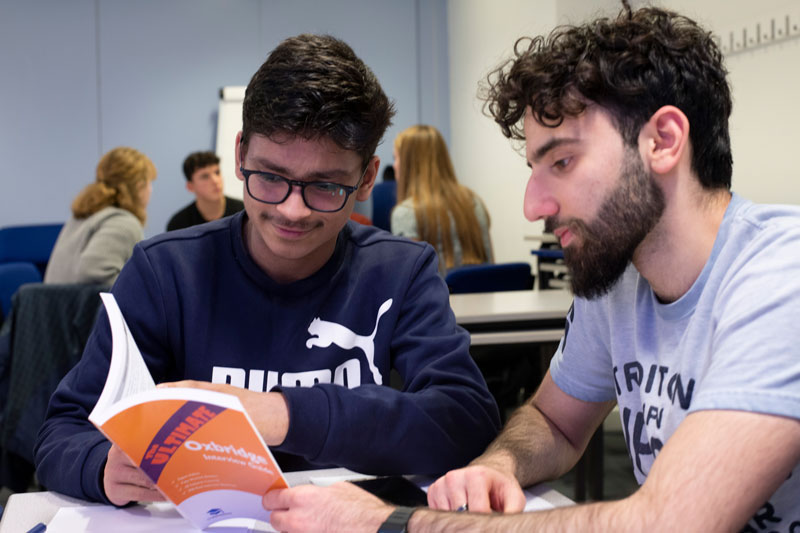When it comes to exams, university applications and other major tasks for students, there’s a wide range of support options available. Books, courses, question banks; these are all helpful tools to help you through the preparation and revision processes. But one option is often seen as the most effective support method – tuition.
The perception of one-to-one tuition varies from person to person, but most people could benefit from spending individual time with an expert in their field to guide them through their work. But how much benefit do you actually get from tuition and is it worth the time, cost and effort versus independent study?
In this guide, we’ll explore some of the key benefits of one-to-one tuition to determine whether it’s worth it and how you should approach your tuition should you decide to go ahead with it.
What is Tuition?
Firstly, we should consider what tuition actually is. By definition, tuition is simply another word for teaching, although it is mostly used in the context of private teaching with individuals or small groups.
Be aware that in North America, the word “tuition” can also describe the fees for studying at a university or college. We will only consider tuition as a form of teaching in this guide.
To narrow our scope somewhat, we’ll mainly be discussing tuition in a one-to-one context. So what does this mean?
What is One-To-One Tuition?
One-to-one tuition is a style of teaching between one tutor and one student. These sessions are typically held outside of the standard school curriculum and can be used to cover a wide range of topics, tasks and skills. There are multiple reasons why you might consider one-to-one tuition:
- You may be struggling with a certain subject and falling behind your cohort. One-to-one tuition would enable you to have additional teaching time that targets the areas you need to improve.
- You may be overwhelmed by a certain task or subject that you need to prepare for (e.g. the Oxbridge application process). Working with a tutor would help you organise your time properly and find the correct starting point for your preparation.
- Your school may not teach something you need to know, or you may feel that the teaching you receive is inadequate/doesn’t meet your needs. There are a wide variety of tuition options available to suit all needs.
These are some scenarios in which you may consider one-to-one tuition, but why would you need tuition over other support options? And if you do choose the route of tuition, would you get more benefit from working in a small group rather than individually?

One-To-One Tuition Vs Group Tuition
Small group tuition is also available in some cases, which will see one tutor teaching 2 – 5 students at one time. The main benefit that is often assumed of group tutoring is the cost, as it’s generally cheaper to join a small group session rather than having a one-to-one session. However, there are a few other reasons why you may consider group tuition over one-to-one:
- Working with students at a similar level to you allows you to share ideas and discuss your experiences more easily, as you’ll be in a similar position with one another.
- Working within a group means there’s less pressure on you to complete everything asked by the tutor. Sometimes, it may benefit you more to watch another student take on a task than to complete everything yourself.
- For Oxbridge applicants, small group sessions of 2 - 3 students can be very similar to Tutorials at Oxford and Supervisions at Cambridge. Having this simulated experience will help you understand how these sessions work and what you need to bring to the table.
These benefits are certainly something to consider, but they don’t necessarily make group sessions objectively better. Sometimes, this style of teaching will suit you better, but there are many benefits to one-to-one tuition that aren’t present here.
Group sessions are less flexible in terms of timings, you’ll have less dedicated time from your tutors and you may not agree with or get along with some of your fellow students. These won’t always be an issue, but it’s important to understand that one-to-one tuition has many benefits of its own.
In some cases, a mixture of both teaching styles would be best as it lets you have the experiences from supplemental group sessions while still keeping all the benefits from one-to-one tuition. However, this usually comes at the cost of having to work with different providers (unless you’re working within a set tuition programme from one organisation).
Access tuition from the top students at Oxbridge with UniAdmissions
Each of our students is assigned a high-performing tutor from their subject to guide them through each step of the application process. These sessions, combined with our carefully crafted curriculum, vast array of materials and customised Portal, make our programmes the most effective way to boost your chances of earning an offer.
Discover our Oxbridge Programmes by clicking the button below to learn how you can enrol and triple your chances of success.
With some context about what one-to-one tuition looks like, let’s explore some of the benefits of this style of teaching. Although the benefits for individualised tuition can vary from person to person, these nine benefits are fairly universal:
Let’s explore all of these benefits to see why they justify engaging with one-to-one tuition over other support options.
Personalised Curriculum
Firstly, we should consider what you’ll be learning during your one-to-one sessions. In most cases, this will partially be decided by you and your requirements. While you aren’t going to be responsible for building each of your sessions, you’ll have the chance to guide your study with the support of your tutor.
Ideally, you should spend some time with your tutor in your first session to set a baseline for what you need to focus on and how you wish to progress. Good tutors will then be able to build lesson plans based on what was discussed. However, that doesn’t mean that these plans are set in stone, as you’ll have the chance to shift focus if needed (provided you give your tutor some notice).
This is extremely different from typical school teaching, in which lessons are set far ahead of time based on a single curriculum for the entire year group. This method of teaching is important as it sets the standards for what you need to know, but it’s not as accommodating to those who need more time on a topic or who wish to learn something outside of the set curriculum.
Dedicated Tutor Attention
Since these sessions are one-to-one, you will be the only focus of your tutor during your time together. Of course, this isn’t the case in most other teaching styles as you’ll be working within a class of students who each need attention. But why exactly is it better to have one-on-one time with your tutor?
Firstly, we already mentioned that what you cover will be tailored to your needs. Having that level of control is only possible in a one-to-one environment, but it’s also beneficial because your tutor has the capacity to get in tune with your personality and way of learning.
The custom nature of these tuition sessions doesn’t just come down to content but to how the content is taught as well. Standard teaching has to be fairly unspecialised to avoid alienating any students, but this isn’t the case for one-to-one tuition. Not only can your teacher adjust their teaching style to your needs, but they also have the time to observe how you best perform and adjust their teaching style without solely relying on your requests.
While it may sound risky to have a tutor adjust things without you directly asking, part of your tutor’s job is to experiment with how they deliver the content based on what they know about you and how you work.
Most students initially can’t specify how they best work when studying, so working with a tutor who’s able to experiment could open you up to a whole new way of seeing things that could drastically improve your learning. This is all possible because your sessions are dedicated to you.

Building Deeper Skills
Building on the last point, one-to-one tuition is rarely just about teaching you the content from your syllabus. When you’re working with a great tutor, they’ll be able to teach you broader skills through the context of your subject.
What does this mean exactly? It means that your tutor is teaching you more than the required knowledge for your subject. They’ll also be teaching you far more transferable skills that can help you improve your study skills, exam technique, motivation and other general skills that will be useful in any working context.
This is extremely valuable as it’s not something that is commonly discussed in standard education. However, it’s important to understand how you can succeed at these elements of learning on a more general level, or else you’re less likely to work effectively.
Some people can naturally create effective study skills by themselves, but with a greater reliance on external tools like AI, it’s becoming more important to take a step back and understand what you’re doing while you work and how you can improve your methods.
Access "The Big Book Of Oxbridge Applications" For FREE
If you’re not ready to start tuition but want to learn about the Oxbridge admissions process, download The Big Book Of Oxbridge Applications for free now! Through over 350 pages, you’ll learn about everything you need to know with in-depth guides, plus:
- Over 40 admissions test practice questions
- 28 example Oxbridge Personal Statements
- Interviews with Oxbridge students and graduates
- Additional downloadable resources
Fill in your details below to claim your digital copy today!

Adjustable Learning Pace
In group teaching, you have to work at the pace of the class as teachers rarely have the time to slow things down for the benefit of a single student. If you miss something in class, you’re options are to ask the teacher individually (who may be able to help but will still have limited time), ask your peers (who may also be struggling in that area) or try to learn the topic by yourself (which could take a long time and isn’t always effective).
None of these options are ideal, but one-to-one tuition solves this problem by facilitating a learning pace that meets your needs. While tutors will have a set amount of content to get through in each session, there’s typically a bit of leeway within each session to allow for a slower pace or repeating information where needed.
However, it’s important to remember that you don’t have unlimited time with your tutor, who will usually be scheduled for a certain amount of time in each session. You’ll also normally have a limited number of sessions (though you’ll often have the option to purchase more), so you may have to move on from your area of difficulty for a session so your tutor can reassess how they could support you with it next time.
The pace of your sessions will still be far more flexible than with other forms of teaching though, so one-to-one tuition should definitely be a consideration if you don’t always learn at a quick speed.
Flexibility in Scheduling
Flexibility in when you have your sessions is one of the most obvious benefits to tuition, but it shouldn’t be understated how helpful it can be. When learning at school, you’re stuck to your set timetables during the set opening hours of your school, with very little chance for movement or additional hours.
Similarly, when attending a supplemental preparation course, you’re bound by the dates and times of when the course will be run. One-to-one tuition provides much more freedom for when sessions can be complete as you’re only relying on an agreement between two people; the tutor and student.
While you’re never going to get full availability from a tutor (they have lives too!), they will usually be able to accommodate your scheduling needs. When choosing a tutor, it’s important to know roughly when you’ll need your sessions to take place so that you can confirm whether tutors will be available. As long as you do your due diligence, you shouldn’t have any scheduling issues under normal circumstances.
Of course, changes do happen and you may find yourself needing to reschedule, which will usually be possible if enough notice is given. This goes both ways too as tutors may need to cancel or reschedule sessions. While never ideal, it’s a small price to pay for having the freedom to attend your sessions at a time that suits you.
This benefit can be especially important for those in different time zones. For example, you may be a non-UK citizen looking for support for your Oxford and Cambridge applications. Ideally, you would want to work with someone who has attended your university of choice, meaning they’ll likely be in the UK timezone (GMT). If you go down the route of one-to-one tutoring, it will be much easier to find a tutor who can work during a time that suits you. It’s a benefit that no other form of support can offer.

Continuity In Teaching
One element of teaching that isn’t frequently discussed is the continuity, or consistency, of what you’re being taught. At school, you’ll be learning from a wide variety of teachers for different subjects. This isn’t an issue in itself as different teachers have different specialities, but it can lead to a lack of continuity in your teaching, especially when it comes to general skills.
When working with a tutor, you’re learning from a singular person with their own methods and skills. Tutors will often create their own session materials and lesson plans, so you can be sure that what they’re teaching you is what they believe will make you successful without any contradiction. When you’re working with a great tutor, it can be incredibly valuable to have a figure you can look to for answers.
This isn’t always the perfect approach as tutors can sometimes get things wrong, but if you trust your tutor, you’ll be sure to receive consistent and helpful lessons from them that will elevate your knowledge and abilities. If you don’t agree with something a tutor has said, discuss it with them and express your own beliefs – healthy debate can also be incredibly valuable.
In-Depth Feedback & Tasks
One of the most important things in learning is feedback. It’s crucial for your development that you receive honest summaries of how you did, what progress you made and what you should do to improve yourself further.
When learning at school, you’ll typically receive in-depth feedback like this once every few weeks or so and usually from different teachers (see previous point). When working with a good tutor, you should receive this feedback after each session. This feedback has the potential to form the foundation of the rest of your study, so it’s important to always take note of what your tutor says and ask for feedback if you haven’t already received it.
As well as feedback, some tutors will give you additional tasks to complete in between sessions (essentially homework). However, this will differ from the homework you receive at school, which is usually broad enough to cover the majority of what was taught in that class. A good tutor will work with their student to determine the right task for them to complete in between sessions so that the work is meaningful, achievable and solely focused on improving their weak spots.
When you receive homework from a tutor, it’s vital that you take it seriously and complete it as intended as it has specifically been assigned to boost your skills and help you develop outside of your sessions.
Greater Experience Level
This benefit doesn’t always apply, but it’s incredibly important in some scenarios. When it comes to education, most students would want to be taught by someone with relevant experience in their field. While learning from someone with in-depth knowledge but a lack of real-world experience can be perfectly fine for some subjects, there are times when actual experience is very important.
For example, let’s look at Oxbridge application support. While it’s possible to be taught the basics by someone who didn’t attend either of these universities, most students would hope to be taught by someone with an actual experience of successfully getting through the application process.
Since you’re able to choose who tutors you in one-to-one tuition, you have the option to seek someone with experience in your specific subject at the university you’re applying for. This is extremely important for areas such as university applications, as the skills required for getting an offer aren’t always objective methods that can be taught by anyone. Sometimes, it’s far more valuable to hear from someone who completed the process themselves to learn from what they did to find success.

Greater Freedom In Learning
Lastly, it’s important to consider that tutors have much more freedom in what they can teach versus traditional education. We’ve already explained how the standard class format can limit how much attention students receive and how personalised lessons can be, but teachers are also limited in what they can teach as well.
Schools will each have a strict curriculum and syllabus of topics that must be kept to. While this is incredibly important, as the curriculum covers vital information for examinations and skills in later life, it can also be very restrictive and unsuited to some students. Put simply, the standard school teaching style limits the exploration that some students may require.
When working with a tutor, you’ll have an option to explore more varied topics, particularly ones that the tutor is interested in. When choosing a tutor, it may be a good idea to find out a bit about what their background is and where their interests lie. If these interests match up with yours or sound like something you’d like to learn about, then the tutor will likely be a good match.
Exploration in education is especially important for Oxbridge applicants, as Oxford and Cambridge both heavily emphasise super-curricular activities and wider reading from their applicants. If you’re applying to either of these universities but don’t know where to start with your expanded studies, working with an Oxbridge tutor may be a good option to consider.
That covers some of the many reasons why you should consider working with a tutor. There are more reasons than this that you could consider and not all of these benefits will impact each student in the same way, but it should be clear by now that one-to-one tuition is a great choice for anyone looking to dive further into their education.
However, despite all of these benefits, there are also some risks you should consider too, so let’s take a look at those:
Risks Of One-To-One Tuition
One-to-one tuition can be a fantastic experience that greatly elevates a student’s abilities and chances of success, be it in an exam, coursework, university application or more. However, this experience is dependent on the quality of the tuition you’re receiving. There are a number of things that can go wrong, both from the tutor’s end and the student’s. Here are some of the problems you may face when engaging with one-to-one tuition:
Poor Session Scheduling/Regular Cancelations
We’ve already explored how tuition can provide a great degree of flexibility with your schedule, but this flexibility can also be a major drawback in some cases. Since there are usually no formal requirements for tuition sessions to take place at a certain time beyond the agreement made, it’s very easy for sessions to get cancelled or rescheduled at a moment’s notice.
As we said, rescheduling in itself isn’t an issue when done with reason and with appropriate notice, but without either of these, it can become a nightmare. This isn’t exclusive to just the student or tutors as both parties can be guilty of poor time management. However’s responsible though, regular cancellations and rescheduling can damage the relationship between tutor and student and make the whole process more difficult.
Unmotivated Tutors
It’s a fact that the vast majority of tutors are being paid in some way for their time, but that isn’t the whole picture. You’re not just paying for their time but also their knowledge, their experience and their passion for the subject. Many tutors engage in tuition because they love their subject and want to support others through it, but you may encounter some who are more interested in financial incentives or the extra-curricular experience for their C.V.
Tutors who are less interested or less skilled in teaching won’t be able to deliver the knowledge you need in a very engaging or effective manner, meaning your sessions will generally be less useful. They’ll also be less keen to explore topics outside of the necessities or provide in-depth feedback to help you continue your progress outside of the sessions.
Poor Lesson Planning
Being able to teach concepts to students is a skill almost all tutors have, but it’s a completely different skill to be able to plan a full, coherent lesson. Unfortunately, some tutors aren’t as good at this, which can leave sessions feeling unorganised and not an efficient use of time. The content may be good, but the delivery is just as important to ensure you actually retain the information.
A good tuition session should have some form of structured presentation (such as slides or notes), as well as chances for the student to ask questions and take part in interactive tasks. Most importantly, the teaching style should be adapted to how the student best learn.
Lack Of Feedback or Additional Tasks
While many students may dread the idea of additional work outside of their sessions, taking on additional tasks set by your tutor is a fantastic way to truly cement the content of the session in your mind. Beyond that, these tasks will often encourage you to explore information further to learn even more independently.
If the work with your tutor is restricted to just your time together, you’re far less likely to retain everything covered or explore additional concepts and ideas. Independent study is crucial for high-performing university students (especially at Oxbridge), so making a start on it with support from your tutor will give you a head start when you begin your course.
It’s worth noting that many of these issues are more common when working with a random, independent tutor. When working with an individual, you rely on their ability, honesty and motivation to provide actual value to your sessions.
For more of a quality guarantee, you may wish to instead seek a tutor working on behalf of a trusted preparation organisation. While prices may be higher, you’ll benefit from greater reliability thanks to these points:
- Preparation organisations have strict vetting processes when hiring tutors based on the standards they wish to maintain.
- When issues occur with your tutor, you will have someone to contact to seek a resolution to the problem, be it a change of tutor, a rescheduling of a session or a refund.
- Many preparation organisations will offer their students additional resources like books and question banks to support their learning.
As an example, students at UniAdmissions – The World’s First Oxbridge Preparatory School – rarely face any of these issues due to our strict tuition standards, comprehensive tutor-student matching system and highly trained programmes team who are there to offer support whenever needed. With all of these measures in place, our students are guaranteed a fantastic experience with their tutor and quick, effective support if issues arise.
What’s more, our one-to-one tuition sessions are just one of six pillars of support included within our Oxbridge Programmes. Our students also have access to live group courses, enrichment sessions, an all-encompassing suite of preparation materials and much more. Your tutor can monitor your progress and access many of your materials too, creating a fully interlinked support programme.
We hope this guide has helped you better understand the benefits of tuition and dispel some of the concerns you may have had. However you decide to approach your preparation, we wish you the very best of luck and are here to offer support for your Oxbridge application whenever you need it!
Our world-class Oxbridge tutors are ready to triple your chances of earning your offer.
At UniAdmissions, we’ve spent over a decade perfecting our formula for Oxbridge success. A massive part of this formula is the guidance offered by our team of over 1,000 tutors who are all highly skilled in teaching everything you need to know for your application.
Discover our Oxbridge Programmes by clicking the button below to learn how you can enrol and triple your chances of success.







